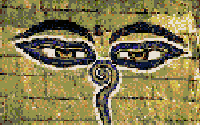
KARMA
First one notion must be cleared up, which is the distinction
between incarnation debt and the purely western notion of instant
karma. An important principle is Pratitya Samutpadha, a pleasant
term to repeat, which refers to the total interconnection of
everything in the univers. It is the motion that turns the wheel of
life and rebirth, samsara. This interconnectedness is of a
kinetic quality, assuring that for each action there will be an
equal and relative reaction. For each act of evil, the next life
will be appropriately difficult, or challenging. A keeper of slaves
may become a slave in their next life. As the devotion to this idea
grows, along come concepts such as vegetarianism for fear of
becoming the creatures that one eats. Tantrics feel the mystical
path is one of reward, sort of insurance that their next
incarnation will be a continuation of this path. Their focus is not
so much on restriction, just as the masses who find restraint
sensible for festivals and the like do not mind forgoing the taxing
and ecstatic behaviours of the mystics.
Instant karma, therefore, may be a part of pratitya samutpadha, an
instant response, but is not related to karma itself, which explains
all things positive and negative which are experienced by the person
during this lifetime. Karma is very different from sin. There is
no real absolution or forgiveness, only a reminder to insure a
better future by correcting one's ways.
Why is suffering so unicersal in eastern thought? The core idea in
suffering is the burden of conscience. During animal existence,
there is no desire, simple the acting out of behaviour. There also
is no possibility to act out the path of enlightenment. As humans,
we are tossed into a battle by possessing a conscience. We are torn
between what was (fulfilment of animal desire in innocence) and what
may be (abandonment of animal nature, embracing the path of
enlightenment). By knowing the results of actions taken for granted
in the animal world, we suffer unlike any creature. Like other
creatures we suffer pain, the animal sufferings. Like some animals
we suffer emotions, pain of the heart [adhara]. But only as humans
do we suffer the failings of conscience, the ability to desire more
than is presented before us: namely unnecessary apetites and the
higher self.
"Being ignorant in a previous life as to the significance of our
existance, we let loose our desires and act wontonly. Owing to this
karma we are destined in present life to be endowed with
consciousness, name-and-form, the six organs of sense and sensation.
By the exercise of these faculties we desire for, hanker after,
cling to these illusive existances, which have no ultimate reality
whatever. In consequence of this 'will to live' we potentially make
up the karma that will lead us to further metapsychosis and death."
--Vasubandhu, Adhidharmakosa